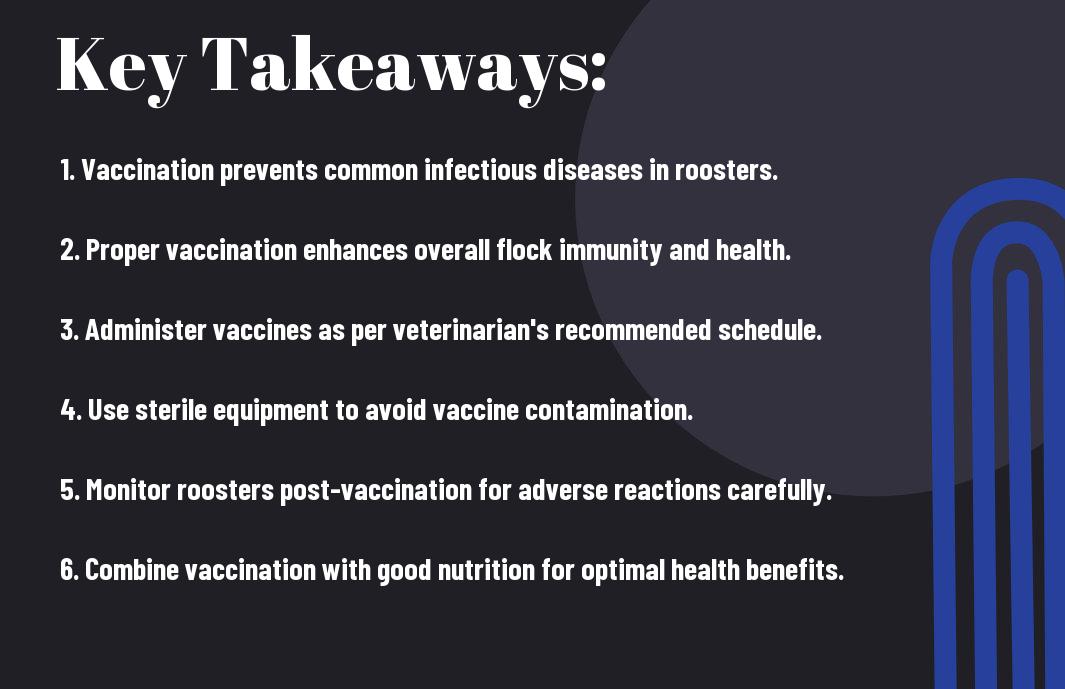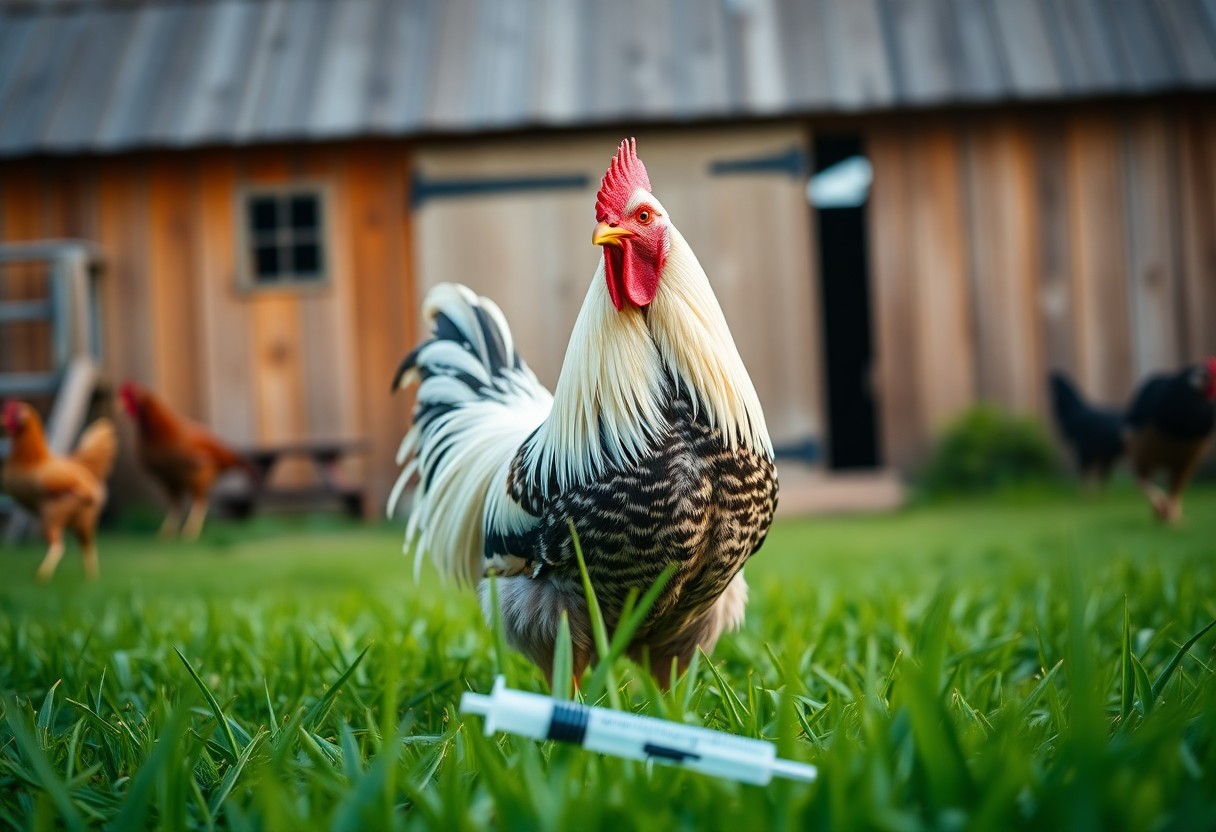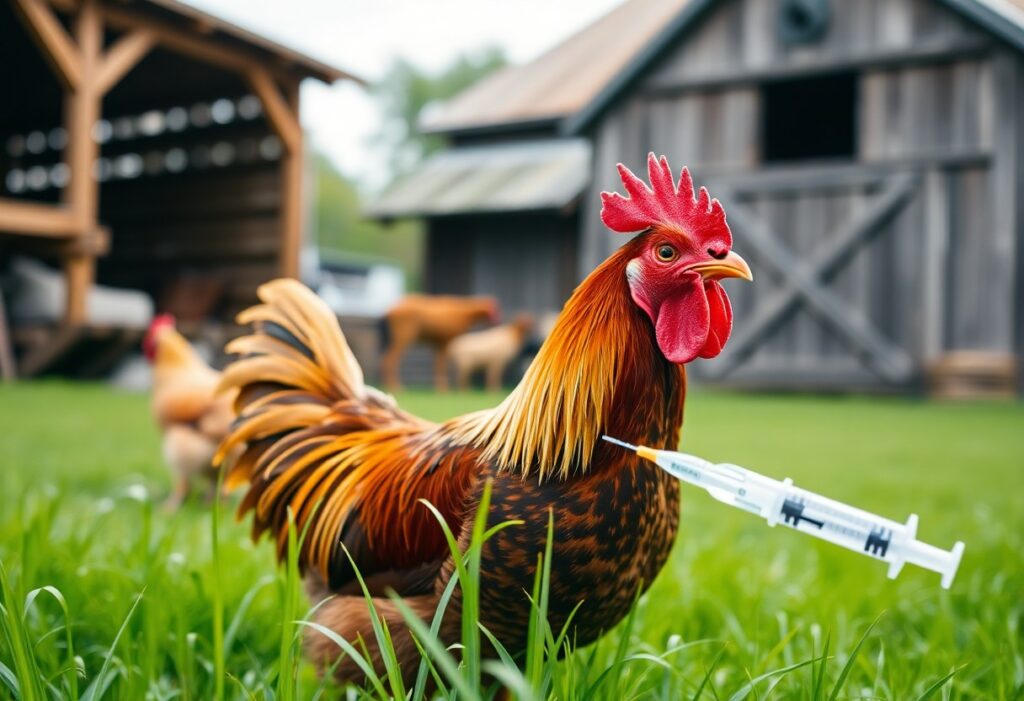Rooster health is vital for a thriving flock, and one of the best ways to protect your birds is through vaccination. By vaccinating, you can significantly reduce the risk of serious illnesses that can devastate your roosters and affect your entire poultry operation. Understanding the conditions they may face and staying informed on the latest vaccination protocols will help you ensure your roosters remain healthy and productive. This post will guide you through vital vaccination information and strategies to keep your flock in top condition.
Key Takeaways:
- Vaccination is necessary for preventing common diseases in chickens, ensuring their health and productivity.
- Understanding the vaccination schedule and the specific vaccines required for different breeds can help maintain a robust flock.
- Good management practices, along with vaccination, play a vital role in supporting overall rooster health and minimizing disease outbreaks.


Importance of Vaccination in Poultry
As a poultry owner, understanding the importance of vaccination is necessary for maintaining your flock’s well-being and productivity. Vaccination helps prevent various diseases that can negatively impact your birds, leading to better overall health and enhanced production. By vaccinating your birds, you ensure a healthier flock and safeguard your investment.
Disease Prevention
Below are some of the main diseases that vaccination can help prevent, including Newcastle disease, infectious bursal disease, and avian influenza. These diseases can spread quickly and devastate your flock, leading to significant losses. By implementing a vaccination program, you can significantly reduce the incidence of these diseases and protect your birds.
Enhanced Production Performance
Below, vaccination plays a significant role in enhancing the production performance of your poultry. Healthier birds are more productive, resulting in improved egg-laying rates and increased meat yield. Effective vaccinations can minimize the risk of disease-related losses, allowing your flock to reach its full production potential.
Production performance is directly influenced by the health status of your flock. When you vaccinate your birds against common diseases, you help prevent stress and mortality, which can severely impact their productivity. Healthy birds consistently contribute higher egg production, better feed conversion, and superior overall growth rates. Investing in vaccinations ensures your flock’s health and productivity, thus maximizing your returns and supporting a sustainable poultry operation.
Common Vaccines for Roosters
Even though healthy roosters can have strong immune systems, vaccination is vital for preventing diseases. By ensuring your roosters receive the appropriate vaccines, you protect their health and enhance their productivity. Not only does this safeguard their well-being, but it also improves the overall health of your flock, making vaccination a key aspect of responsible poultry management.
Vaccines for Viral Diseases
Vaccines play an necessary role in preventing viral diseases among your roosters. Common viral vaccines include those for diseases like Marek’s disease, Newcastle disease, and Infectious Bronchitis. Administering these vaccines helps you protect your roosters from severe illnesses that can lead to reduced productivity or even death, ensuring a thriving flock.
Vaccines for Bacterial Infections
With proper vaccination against bacterial infections, you can shield your roosters from harmful pathogens that can threaten their health. Common bacterial vaccines target diseases such as fowl cholera and coryza, which can have devastating effects on your flock if left unaddressed.
It is important to vaccinate your roosters against bacterial infections to prevent outbreaks in your flock. These vaccinations can significantly reduce the risk of diseases like fowl cholera, known for causing high mortality rates, and coryza, which can lead to severe respiratory issues. By keeping your roosters up to date on their vaccines, you can maintain a healthy, productive flock, ensuring they continue to thrive and contribute to your poultry operation.
Vaccination Schedule
Despite the importance of vaccinations, many poultry keepers are unsure of the appropriate schedule for their roosters. Following a structured vaccination schedule is imperative for maintaining their health and preventing the spread of diseases within your flock. Consult your veterinarian to tailor a vaccination plan that fits your specific needs and region.
Timing for First Vaccination
Beside selecting the right vaccines, timing plays a vital role in your rooster’s health. Generally, the first vaccination should be administered when your roosters are around 6 to 12 weeks old. Early vaccination can help protect them from diseases during their most vulnerable stage of development.
Booster Shots and Timing
Across your roosters’ lifetime, booster shots will be necessary to ensure continued immunity against certain diseases. These shots may be required annually or biennially, depending on the vaccine type and the disease’s threat level. It’s imperative to keep track of their vaccination history to maintain optimal health.
Also, ensure that you schedule booster shots according to the vaccine guidelines provided by your veterinarian. It is advisable to keep an updated vaccination record for your roosters, as this helps to monitor their immunity status. Given that some diseases can be particularly infectious and harmful, keeping up with booster shots will help protect not just your roosters, but also prevent potential outbreaks within your flock. If unsure, consult your veterinarian to adjust the timing based on specific conditions or regional disease prevalence.
Administration Methods
Keep in mind that the method of vaccination can impact both the effectiveness of the vaccine and the overall health of your rooster. Different methods are available, including injectable, oral, and spray vaccines, each with its own benefits and considerations to ensure your flock receives optimal protection.
Injectable Vaccines
Any vaccination administered via injection typically provides a reliable and rapid immune response in your rooster. It is crucial to administer these injections correctly, ensuring the right dosage is used and the vaccine is given at the appropriate site to maximize efficacy.
Oral and Spray Vaccines
On the other hand, oral and spray vaccines offer alternative options for vaccinating your roosters. These methods can be less invasive and may simplify the process, particularly for larger flocks.
Understanding oral and spray vaccines is vital for managing your flock’s health effectively. Oral vaccines are typically delivered through their drinking water or feed, allowing for easier administration, especially if you have many birds. Spray vaccines involve atomizing the vaccine for inhalation, which can be convenient, but you must ensure all birds receive adequate exposure. However, with these methods, you may face challenges in ensuring consistent dosing, which could affect immunization levels across your flock. Always monitor the response post-vaccination for any adverse effects to ensure your roosters remain healthy.
Monitoring Rooster Health Post-Vaccination
Many individuals underestimate the importance of monitoring your rooster’s health after vaccination. Keeping a close eye on their behavior, appetite, and overall physical condition can help you quickly identify any potential issues. Regularly checking for changes in demeanor can ensure a swift response to any health concerns, ensuring your rooster remains healthy and vibrant.
Signs of Adverse Reactions
With vaccination, it’s vital to be vigilant for signs of adverse reactions in your rooster. Symptoms such as lethargy, swelling at the injection site, or changes in eating and drinking habits may indicate a negative response to the vaccine. Recognizing these signs early can help you take appropriate action and seek veterinary assistance if necessary.
Importance of Follow-Up Care
Above all, follow-up care is vital for your rooster’s well-being after vaccination. This stage allows you to monitor your rooster for any side effects and ensure they are recovering as expected. Regular check-ups can make a significant difference in your rooster’s health status.
In addition, after your rooster has been vaccinated, it’s vital to maintain a consistent follow-up care routine. Regularly assessing their health enables you to spot any potential complications, such as severe allergic reactions or infections, which can arise after vaccination. Being proactive in your care will not only aid in the recovery process but also will help you establish a positive environment for your rooster’s overall health and immunity moving forward.
Best Practices for Rooster Owners
All rooster owners should prioritize the health and wellbeing of their flocks by implementing best practices. Regular health checks, proper nutrition, and a clean living environment are fundamental elements to ensure robust and thriving roosters. You should also consider vaccination as a preventive measure against commonly occurring diseases, helping to reduce the risk of illness within your flock.
Record Keeping
Above all, maintaining accurate and up-to-date records of your flock’s health and vaccination history is vital. This practice allows you to monitor any potential health issues and track vaccination schedules effectively, ensuring that each rooster receives timely vaccinations. By keeping these records, you can identify patterns and make informed management decisions that promote the overall health of your roosters.
Integrating Vaccination into Management Plans
Practices involving vaccination should be integrated into your overall flock management plan to enhance health outcomes. Schedule vaccinations during routine health checks to ensure every rooster is protected against diseases. Due to the potential for outbreaks, having a structured vaccination timetable can make a significant difference in maintaining a healthy flock. Timely vaccinations not only safeguard your roosters but also promote a positive environment for breeding and productivity. Be proactive in discussing vaccination strategies with your veterinarian to tailor a program that fits your specific needs and challenges. By prioritizing vaccination, you contribute to the long-term health and success of your roosters.
To wrap up
Now that you understand the importance of vaccination and how it directly affects your rooster’s health, it’s imperative to stay proactive in your care routine. By ensuring your roosters receive the appropriate vaccines, you can protect them from various diseases, enhancing their overall well-being and longevity. Always consult with a veterinarian to choose the right vaccination schedule for your flock. With the right knowledge and practices, you can maintain a healthy, thriving environment for your roosters.
Q: Why is vaccination important for rooster health?
A: Vaccination plays a significant role in protecting roosters from various infectious diseases that can compromise their health and the overall wellness of the flock. By administering vaccines, poultry owners can significantly reduce the risk of outbreaks from diseases such as Marek’s disease, Newcastle disease, and Infectious Bronchitis. Healthy roosters are crucial for breeding and ensure optimal reproductive performance, which is vital for maintaining a productive flock. Additionally, vaccinated roosters can help prevent the spread of diseases to hens and chicks, ensuring a healthier environment for the entire poultry operation.
Q: What vaccines should be considered for roosters?
A: When planning a vaccination program for roosters, it’s important to consider several key vaccines. Commonly recommended vaccines include those for Marek’s disease, Newcastle disease, and Infectious Bronchitis. Depending on the region and specific risks, other vaccines such as Avian Influenza and Coccidiosis may be necessary. Consultation with a veterinarian who specializes in poultry can help determine the most appropriate vaccination schedule and specific vaccines needed based on the flock’s age, size, and health status. This tailored approach ensures maximum protection for the roosters and the entire flock.
Q: How often should roosters be vaccinated?
A: The frequency of vaccinations for roosters can vary based on the type of vaccine and the specific health needs of the flock. Generally, initial vaccinations are administered to chicks at a young age, typically around one day to a few weeks old. Depending on the vaccine, booster doses may be given at certain intervals, such as annually or every few years. It is crucial to follow the manufacturer’s recommendations and consult with an avian veterinarian to establish a proper vaccination timeline. Regular health check-ups can also help assess the need for additional vaccinations based on any emerging diseases or health challenges in the flock.











